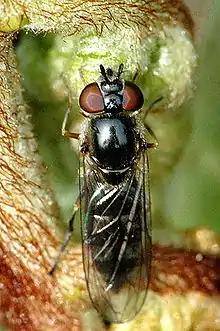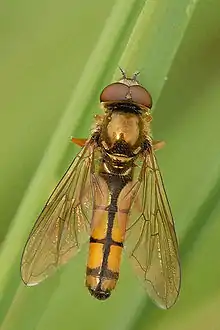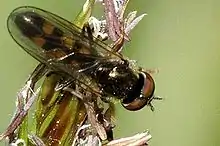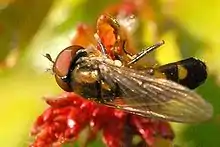Platycheirus
| Platycheirus | |
|---|---|
 | |
| Platycheirus clypeatus female | |
| Scientific classification | |
| Kingdom: | |
| Phylum: | |
| Class: | |
| Order: | |
| Family: | |
| Subfamily: | |
| Tribe: | |
| Genus: | Platycheirus le Peletier & Serville, 1828 |
| Synonyms | |
| |
Platycheirus is a large genus of hoverflies.[1]
Species
Subgenus: Carposcalis Enderlein, 1938
- P. bertrandi (Kolenati, 1913)[2]
- P. confusus (Curran, 1925)
- P. fenestratum (Macquart, 1842)[3]
- P. longigena (Enderlein, 1912)[2]
- P. lundbecki (Collin, 1931)
- P. lundbladi Enderlein, 1940 - Juan Fernández Islands[3]
- P. stegnus (Say, 1829)
- P. trichopus (Thomson, 1869)
- P. willistoni (Goot, 1964)
Subgenus: Eocheilosia Hull, 1949[4]
- P. antipodus (Hull, 949b)
- P. captalis (Miller, 1924)
- P. clarkei Miller, 1921
- P. cunninghami (Miller, 1921)
- P. fulvipes (Miller, 1924)
- P. harrisi (Miller, 1921)
- P. howesii (Miller, 1921)
- P. huttoni Thompson in Thompson & Vockeroth, 1989
- P. leptospermi (Miller, 1921)
- P. lignudus Miller, 1921
- P. myersii (Miller, 1924)
- P. notatus (Bigot, 1884)
- P. ronanus (Miller, 1921)
Subgenus: Pachysphyria Enderlein, 1938
- P. ambiguus (Fallén, 1817)[5]
- P. barkalovi Mutin, 1999[6]
- P. brunnifrons Nielsen, 2004[6]
- P. dexter (Harris, 1780)
- P. immaculatus Ohara, 1980[6]

Platycheirus albimanus female
.jpg.webp)
Platycheirus manicatus female

Platycheirus occultus female
Subgenus: Platycheirus le Peletier & Serville, 1828
- P. abruzzensis van der Goot, 1969
- P. aeratus Coquillett, 1900
- P. albimanus (Fabricius, 1781)
- P. amplus (Curran, 1927)
- P. angustatus (Zetterstedt, 1843)
- P. angustipes Goeldlin, 1974
- P. atra (Curran, 1925)
- P. aurolateralis Stubbs, 2002
- P. carinatus Curran, 1927
- P. chilosia (Curran, 1927)
- P. ciliatus Bigot, 1884
- P. ciliger Loew, 1856
- P. cintoensis van der Goot, 1961
- P. clypeatus (Meigen, 1822)
- P. coerulescens (Williston, 1887)
- P. complicatus (Becker, 1889)
- P. concinnus (Snow, 1895)
- P. coracinus Vockeroth, 1986
- P. cyaneus (Müller, 1764)
- P. discimanus (Loew, 1871)
- P. europaeus Goeldlin, Maibach & Speight, 1990[7]
- P. fasciculatus (Loew, 1856)
- P. femineum Curran, 1931
- P. flabella Hull, 1944
- P. fulviventris (Macquart, 1829)
- P. groenlandicus Curran, 1927
- P. hesperinus Vockeroth, 1986
- P. hispidipes Vockeroth, 1986
- P. holarcticus Vockeroth, 1986
- P. hyperboreus (Staeger, 1845)
- P. immarginatus (Zetterstedt, 1849)
- P. inversus Ide, 1926
- P. islandicus (Ringdahl, 1930)
- P. jaerensis Nielsen, 1971
- P. kelloggi (Snow, 1895)
- P. kittilaensis Dusek & Láska, 1982
- P. laskai Nielsen, 1999
- P. lata (Curran, 1922)
- P. latimanus (Wahlberg, 1845)
- P. latitarsis Vockeroth, 1986
- P. luteipennis (Curran, 1925)
- P. manicatus (Meigen, 1822)
- P. melanopsis Loew, 1856
- P. modestus Ide, 1926
- P. monticola Jones, 1917
- P. muelleri Marcuzzi, 1941
- P. naso (Walker, 1949)
- P. nearcticus Vockeroth, 1986
- P. nielseni Vockeroth, 1986[5][8]
- P. nigrofemoratus (Kanervo, 1934)
- P. nodosus Curran, 1923
- P. normae Fluke, 1939
- P. obscurus (Say, 1824)
- P. occidentalis Curran, 1927
- P. occultus Goeldlin, Maibach & Speight, 1990[5][7]
- P. octavus Vockeroth, 1986
- P. orarius Vockeroth, 1986
- P. pacilus (Walker, 1849)
- P. parmatus Róndani, 1857
- P. parvus (Williston, 1882)
- P. peltatoides Curran, 1923
- P. peltatus (Meigen, 1822)
- P. perpallidus (Verrall, 1901)
- P. pilatus Vockeroth, 1986
- P. podagrata (Zetterstedt, 1838)
- P. podagratus (Zetterstedt, 1838)
- P. protrusus Vockeroth, 1986
- P. quadratus (Say, 1823)
- P. ramsaerensis Goeldlin, Maibach & Speight, 1990
- P. rufigaster Vockeroth, 1986
- P. rufimaculatus Vockeroth, 1986
- P. scamboides Curran, 1927
- P. scambus (Stæger, 1843)
- P. scutatus (Meigen, 1822)
- P. setitarsis Vockeroth, 1986
- P. speighti Doczkal, Stuke & Goeldlin, 2002
- P. spinipes Vockeroth, 1986
- P. splendidus Rotheray, 1998
- P. squamulae (Curran, 1922)
- P. stegnoides Vockeroth, 1986
- P. sticticus (Meigen, 1822)
- P. striatus Vockeroth, 1986
- P. subordinatus (Becker, 1915)
- P. tarsalis (Schummel, 1836)
- P. tatricus Dusek & Láska, 1982
- P. tenebrosus Coquillett, 1900
- P. thompsoni Vockeroth, 1986
- P. thylax Hull, 1944
- P. transfugus (Zetterstedt, 1838)
- P. urakawensis (Matsumura, 1919)
- P. varipes Curran, 1923
- P. woodi Vockeroth, 1986
Subgenus: Pseudoplatychirus Doesburg, 1955
Subgenus: Pyrophaena Schiner, 1860 - often considered a full genus.
- P. granditarsus (Forster, 1771)
- P. rosarum (Fabricius, 1787)
References
- Stubbs, Alan E. & Falk, Steven J. (1983). British Hoverflies: An Illustrated Identification Guide. British Entomological and Natural History Society. pp. 253, xvpp.
- Wakeham-Dawson, A.; Jones, A.G.; Thompson, F.C. (2009). "Falkland Islands Syrphidae (Diptera)". Dipterists Digest. Second series. UK: Dipterists Forum. 16 (1): 65–71. ISSN 0953-7260.
- Revista chilena de entomología vol.4 (1951) https://archive.org/details/revistachilenade41955soci
- Frederic Christian Thompson (2008). "A conspectus of New Zealand flower flies (Diptera: Syrphidae) with the description of a new genus and species" (PDF). Zootaxa. 1716: 1–20. ISSN 1175-5326. Archived from the original (PDF) on 2011-08-14. Retrieved 2009-10-19.
- Chandler, Peter J. (1998). "Checklists of Insects of the British Isles (New Series) Part 1: Diptera". Handbooks for the Identification of British Insects. 12. Royal Entomological Society: 108. Cite journal requires
|journal=(help) - Mutin, V.; Gilbert, F. & Gritzkevich, D. (2009). "The potential for using flower-visiting insects for assessing site quality: hoverfly visitors to the flowers of Caltha in the Far East region of Russia". Egyptian Journal of Biology. 11: 71–83. Retrieved 7 February 2011.
- de Tiefenau, Pierre Goeldlin; Maibach, Alain; Speight, Martin C. D. (1990). "Sur quelques especes de Platycheirus (Diptera, Syrphidae) nouvelles ou maconnues". Dipterists Digest. First series (in French). 5 (1): 19–44.
- Vockeroth, J. R. (1990). "Revision of the Nearctic species of Platycheirus (Diptera, Syrphidae)". Canadian Entomologist. 122 (4): 659–766. doi:10.4039/Ent122659-7.
- Barkalov, A. V. (2007). "A genus and a species of hover-flies, new for the Russian fauna (Diptera, Syrphidae)". Entomological Review. 7 (7): 930–933. doi:10.1134/S0013873807070172.
- Ximo Mengual; Gunilla Ståls; Santos Rojo (2008). "First phylogeny of predatory flower flies (Diptera, Syrphidae, Syrphinae) using mitochondrial COI and nuclear 28S rRNA genes: conflict and congruence with the current tribal classification" (PDF). Cladistics. 24 (4): 543–562. doi:10.1111/j.1096-0031.2008.00200.x. Archived from the original (PDF) on 2009-04-09. Retrieved 2009-10-19.
This article is issued from Wikipedia. The text is licensed under Creative Commons - Attribution - Sharealike. Additional terms may apply for the media files.

.jpg.webp)


